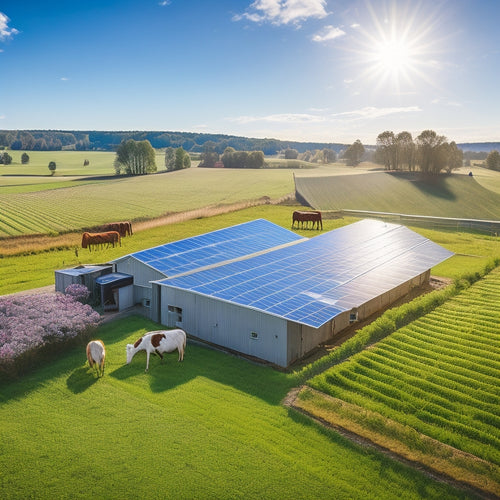
Benefits of Off Grid Solar Panels
Share
Off-grid solar panels offer you energy independence by reducing reliance on utility companies and decreasing your electricity bills. You'll enjoy significant financial savings, as they generate personal electricity and provide predictable costs, shielding you from rising energy prices. Additionally, these systems employ renewable energy, which minimizes your carbon footprint and promotes environmental sustainability. With lower long-term maintenance costs and the flexibility to store excess energy, off-grid solar panels align with your sustainable lifestyle. Exploring their efficiency and how they meet your energy needs can be highly beneficial for achieving lasting independence in energy production.
At a Glance
- Off-grid solar panels reduce electricity bills, providing financial savings and control over energy consumption for a sustainable lifestyle.
- They offer autonomy from utility companies, allowing users to manage their own electricity production and consumption.
- Utilizing renewable energy, off-grid solar systems minimize carbon footprints and reliance on fossil fuels, promoting environmental sustainability.
- Regular maintenance and high efficiency of solar panels lead to lower long-term repair costs and improved energy generation.
- Investing in off-grid solar encourages energy independence, protecting users from rising utility costs and volatile energy prices.
Energy Independence and Savings
By investing in off-grid solar panels, you can substantially reduce your electricity bills while gaining freedom from reliance on utility companies.
This shift not only lowers your monthly expenses but also enables you to control your energy consumption, contributing to a sustainable lifestyle through renewable energy sources.
Ultimately, embracing this technology paves the way for true energy independence and long-term savings.
Reduced Electricity Bills
In the current era, where energy prices are constantly on the rise, investing in off-grid solar panels can considerably reduce your electricity bills while granting you greater energy independence. By utilizing the power of the sun, you're not just generating your own electricity; you're also revealing significant solar savings that can translate into more money in your pocket.
Imagine a life where your energy costs are predictable and manageable. With off-grid solar panels, you can generate your own power, leading to lower utility bills or even eliminating them entirely. This can be especially liberating during peak seasons when energy prices soar. The savings you achieve can be reinvested into other areas of your life, reinforcing your path toward financial freedom.
Moreover, as traditional energy sources fluctuate in price and availability, your solar system remains a constant. You're no longer at the mercy of external factors, which enhances your sense of autonomy.
Freedom From Utility Companies
Many homeowners are uncovering the significant freedom that comes with off-grid solar panels, allowing you to break free from the constraints of utility companies.
Imagine achieving true energy autonomy, where your power needs are met without relying on fluctuating rates and policies imposed by external providers. Off-grid systems enable you to utilize the sun's energy, giving you control over your electricity production and consumption.
You're not just escaping utility dependency; you're also opening doors to substantial savings. By investing in solar panels, you can avoid rising energy costs and unpredictable price hikes. This financial independence means you'll allocate funds to more meaningful pursuits rather than inflating utility bills.
Additionally, off-grid solar panels present viable utility alternatives, letting you choose how and when to use energy, optimized for your lifestyle. You can even store excess energy for later use, ensuring you have power when you need it most.
In a world where energy independence is increasingly essential, adopting off-grid solar panels is more than a smart decision; it's a liberating step towards a sustainable future, granting you the freedom to live life on your own terms.
Welcome this change and reclaim your energy sovereignty.
Sustainable Energy Source
When you choose off-grid solar panels, you're tapping into a renewable energy resource that greatly reduces your reliance on fossil fuels.
These systems not only provide a consistent energy supply but also enable you with true energy independence while lowering your energy bills and minimizing your carbon footprint, contributing to a healthier planet.
Renewable Energy Resource
Renewable energy resources, like solar power, offer a sustainable solution to the growing energy demands of our world. By adopting solar panel technology, you can tap into an abundant energy source that's both environmentally friendly and economically viable.
Unlike traditional fossil fuels, solar energy is inexhaustible, allowing you to generate your own electricity without relying on external suppliers or fluctuating energy prices.
The benefits of going off-grid extend beyond just independence; they include considerable financial incentives. Many governments provide renewable energy incentives, such as tax credits and rebates, to encourage the adoption of solar systems.
These incentives can greatly reduce your initial investment, making solar power an attractive option for anyone seeking freedom from utility bills and energy monopolies.
Utilizing solar panel technology equips you to take control of your energy future. You're not just investing in solar panels; you're investing in your autonomy and resilience.
As you capture the sun's energy, you contribute to a sustainable economy while ensuring your energy needs are met, no matter the external circumstances.
Accept the shift to renewable energy, and enjoy the freedom that comes with it.
Reduced Carbon Footprint
Reducing your carbon footprint is one of the most important advantages of adopting off-grid solar panels. By utilizing the power of the sun, you're not only generating your own electricity but also greatly decreasing your reliance on fossil fuels. This shift is vital in a world struggling with climate change, as traditional energy sources contribute extensively to greenhouse gas emissions.
When you implement off-grid solar systems, you're engaging in effective carbon offset strategies. Each kilowatt-hour of solar energy produced means one less unit of energy sourced from carbon-intensive methods. This conscious choice aligns with sustainable practices that prioritize environmental health and longevity.
You're actively participating in a movement that champions renewable energy, ensuring a cleaner planet for future generations. Moreover, the freedom that comes from self-sufficiency means you're less vulnerable to fluctuating energy prices and external energy crises.
You take control over your energy production, contributing to a sustainable lifestyle while minimizing your ecological footprint. Embracing off-grid solar panels isn't just an investment in your home; it's a bold step toward a sustainable future and a cleaner, greener world.
Solar Panel Efficiency Ratings
When you're evaluating off-grid solar panels, understanding efficiency ratings is essential. These ratings not only indicate how well a panel converts sunlight into electricity, but they also help you gauge the overall performance you can expect from your system.
Factors like temperature, shading, and installation quality can greatly impact these ratings, so it's important to take them into account when making your choice. Additionally, regular cleaning and maintenance are critical for maintaining high efficiency, as dust accumulation can drastically reduce energy output.
Ensuring you select high-quality panels also contributes to better overall performance and longevity.
Understanding Efficiency Ratings
Understanding solar panel efficiency ratings is essential for anyone looking to invest in off-grid solar systems. Efficiency ratings reflect how effectively a solar panel converts sunlight into usable energy, directly influencing your energy independence. Higher efficiency panels yield more power from the same amount of sunlight, allowing you to maximize your energy output and minimize space usage.
When evaluating solar panels, consider performance metrics such as conversion efficiency, which indicates the percentage of sunlight converted into electricity. Advanced panel technology, such as monocrystalline and polycrystalline options, plays a significant role in these ratings. Monocrystalline panels typically offer higher efficiency, making them ideal for limited space situations.
Choosing the right solar panel with superior efficiency ratings enables you to utilize the sun's energy effectively, ensuring your off-grid system meets your needs. By prioritizing efficiency, you can achieve greater energy freedom and reduce your reliance on traditional power sources.
Investing in high-efficiency panels not only enhances your energy production but also contributes to a sustainable lifestyle. So, as you set out on your expedition toward energy independence, make sure you're informed about the efficiency ratings that will shape your solar future.
Factors Affecting Performance
Several key factors influence the performance of solar panel efficiency ratings, and being aware of them can greatly enhance your off-grid solar experience.
First, solar panel orientation plays an essential role in maximizing sunlight exposure; panels facing true south typically yield the best results. Additionally, shading effects from nearby trees or structures can drastically reduce efficiency, so consider clearing obstructions.
Temperature impact is another vital factor; while solar panels operate more efficiently in cooler weather, excessive heat can reduce output. The installation angle should also be optimized based on your location climate to capture the most sunlight throughout the year.
System size and inverter type greatly influence overall performance. A well-sized system customized to your energy needs, combined with a high-quality inverter, guarantees you convert solar energy efficiently.
Battery storage is fundamental for off-grid living, as it allows you to utilize energy for use at night or during cloudy days.
Lastly, regular maintenance frequency and staying updated with technology advancements can keep your system running at peak efficiency.
Selecting Based on Energy Needs
To effectively choose the right off-grid solar panels, you need to assess your energy consumption and evaluate the system capacity that meets your needs.
Start by calculating how much energy you use daily, as this will guide your selection process. Conducting an energy needs assessment will help you understand your consumption patterns, allowing you to guarantee that your solar setup provides reliable power without overwhelming your budget.
Assessing Energy Consumption
When considering off-grid solar panels, accurately evaluating your energy consumption is vital for selecting a system that meets your needs. Start by conducting an energy audit to assess your current usage and identify your consumption habits. This will give you a clear depiction of how much energy you need daily.
Here's a simple table to help you visualize your energy consumption:
| Appliance | Wattage |
|---|---|
| LED Bulb (10 hours) | 10 |
| Refrigerator (24 hours) | 150 |
| Laptop (8 hours) | 50 |
| Washer (1 load) | 500 |
| TV (5 hours) | 100 |
Once you compile this data, total your daily wattage. This figure will guide you in selecting the right size and number of solar panels. Remember, choosing a system that aligns with your energy needs not only improves your independence but also guarantees you utilize the sun's power efficiently. By understanding your consumption habits, you can optimize your off-grid solar setup and adopt a lifestyle that's truly free.
Evaluating System Capacity
Having assessed your energy consumption, the next step involves evaluating the system capacity to guarantee you select solar panels that can adequately meet your needs.
Start with a thorough load analysis, identifying your daily energy usage and peak demands. This will help you understand how much energy your off-grid system must generate.
Next, consider the system design. You'll want to choose solar panels with the right wattage to match your load analysis. For instance, if your daily energy requirement is 30 kWh, and you expect about 5 hours of sunlight, you'll need a system that can produce at least 6 kW of capacity.
Don't forget to factor in potential losses due to inefficiencies or weather variations. It's wise to add a buffer—aim for a system capacity that exceeds your exact needs by about 20%.
This guarantees you won't fall short during high-demand days, giving you the freedom and reliability you desire.
Lower Long-Term Maintenance Costs
When you invest in off-grid solar panels, you're setting yourself up for reduced repair expenses over time.
These systems are designed to be durable and require minimal upkeep, which means fewer trips to the repair shop.
Reduced Repair Expenses
Investing in off-grid solar panels not only generates clean energy but also greatly lowers your long-term maintenance costs. By choosing the right installation techniques and inverter options, you can minimize future repair expenses. Quality battery storage systems, designed with longevity in mind, considerably reduce the likelihood of costly replacements. Furthermore, effective system monitoring helps you identify potential issues before they escalate, ensuring your system operates at peak performance.
Here's a quick comparison to illustrate the potential savings:
| Factor | Traditional Energy Sources | Off-Grid Solar Panels |
|---|---|---|
| Repair Frequency | High | Low |
| Maintenance Costs | High | Minimal |
| Lifespan of Equipment | 5-10 years | 25+ years |
| Dependency on Experts | High | Low |
With proper maintenance tips and a thorough site assessment, you can further enhance your system's reliability. A detailed cost analysis will reveal that off-grid solar panels, while requiring an initial investment, lead to considerable long-term savings. Additionally, regulatory considerations may provide incentives, further reducing your financial burden. Accept the freedom and financial security that off-grid solar energy offers.
Frequently Asked Questions
What Are the Initial Costs of Installing Off-Grid Solar Panels?
When considering off-grid solar panel installation, you'll face substantial initial costs. A cost breakdown reveals expenses for panels, inverters, batteries, and labor. However, this investment provides you with energy independence and long-term savings.
How Do Off-Grid Solar Systems Work During Cloudy Weather?
During cloudy weather, you'll notice reduced energy efficiency in off-grid solar systems. However, they still generate power by capturing diffused sunlight, ensuring you stay powered even under significant cloud coverage, maintaining your independence and freedom.
Can I Expand My Off-Grid Solar System Later?
Think of your off-grid solar system like a growing tree; it can flourish with future upgrades. Yes, you can expand your system scalability, adding more panels or batteries as your energy needs evolve.
Are There Tax Incentives for Off-Grid Solar Panel Installations?
Yes, there're federal incentives and state benefits for off-grid solar panel installations. By taking advantage of these programs, you can greatly reduce your upfront costs, enabling you to achieve energy independence and financial freedom.
How Do I Choose the Right Battery Storage for My System?
Choosing the right battery storage isn't rocket science, but it feels like it. Focus on battery capacity and energy efficiency. You want freedom, so pick one that matches your energy needs without breaking the bank.
Explore More
To summarize, off-grid solar panels not only grant you energy independence but also lead to significant savings over time. For example, consider a family living in a remote area who installed a solar system, eliminating their reliance on expensive generators. As a result, they not only reduced their monthly expenses but also contributed to a cleaner environment. By choosing off-grid solar, you're investing in a sustainable future while enjoying the freedom that comes with self-sufficiency.
Related Posts
-

What Do I Need to Know About Farm Solar Panels
When considering farm solar panels, you need to assess costs, benefits, and technical specifics. Initial investment c...
-

Solar Phone Chargers for Camping Essentials
Solar phone chargers are must-haves for your camping essentials, allowing you to stay connected while enjoying nature...
-

Designing a Green Roof for Maximum Energy Efficiency
Designing a green roof for maximum energy efficiency involves several key strategies. Start by selecting native, drou...


